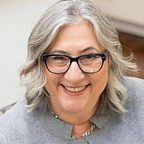The New Normal
My husband has cancer. I never thought I’d be counting my blessings.
When the governor of New Jersey, where I live, issued a stay-at-home order on March 21, I thought: “Hold my beer.”
I’ve been living in a state of emergency for over a year, ever since my husband was diagnosed with head and neck cancer. I work from home, organize my life around essential errands, and turn down most social engagements. Because Jerry’s immune system is compromised, I am super-careful about hygiene. I try not to touch people, no matter how badly I need a hug.
Sound familiar? Cancer professionals call this tiptoeing through existence, “the new normal.” But as millions are discovering, it’s not normal at all.
There are important differences between cancer and COVID-19. Cancer is not contagious; I can hold Jerry’s hand during immunotherapy and drive him to the emergency room when he spikes a fever. Until recently, he had a team of specialists at Columbia Presbyterian attending to his needs. New York City’s medical infrastructure did not buckle under the weight of providing him with adequate care.
Perhaps most important, Jerry’s disease did not spiral out of control in hours or days. We’ve had time. Time to make our wills and talk with our children. Time to enjoy the hand-churned ice cream our friend Jeff leaves on the front porch. Time to walk in the woods, hand in hand, on a sunny spring afternoon.
Because cancer treatment is evolving so rapidly, Jerry has already lived significantly longer than would have been possible a decade ago. At the moment, he’s feeling pretty good. All we really know is that he’s going to die at some point.
Yet as the coronavirus pandemic makes brutally clear, we’re all going to die — some of us unforgivably soon and/or in terrible ways. A friend of ours, a healthy 53-year-old man who dropped off dinner when Jerry needed it and took our son to band practice, is now on a ventilator in intensive care. No one could have predicted that.
I spent the first year of Jerry’s illness alternately convincing myself that a cure was imminent and treating him like he was already in the ground. Neither of these approaches was helpful. In When Things Break Down, Pema Chodron writes, “The most heartbreaking thing of all is how we cheat ourselves of the present moment.” I have learned the truth of this first-hand.
In the current crisis, none of us has the luxury of pretending that “death is something that happens to other people.” But as we stumble through this terrible time, I wonder if we can somehow overcome our paralysis and rage enough to live fully or even, perhaps, joyfully.
Buddhists like Chodron see the practice of acknowledging death as “shaking hands with fear,” and say it leads to relief and enlightenment. I have always considered this to be an absolute crock. I still wake up shaking with terror or grinding my teeth in frustration at the impermanence of it all. I especially hate that Jerry’s illness is not going according to plan; that the artificial lines I’ve drawn between acceptable and unendurable are constantly being wiped out and rewritten.
Still, what choice do I have? At 3 a.m., when Jerry’s rattling, post-surgical snores are keeping me awake, I touch his wasted skin where the radiation has burned it and mourn. But then this morning, I heard him downstairs in the kitchen laughing at fart memes with our teenager.
So yeah, this whole situation sucks. But I’ll take it.
Photo by Lucas Cleutjens on Unsplash
